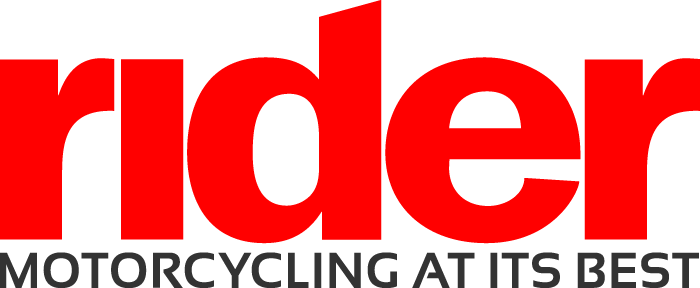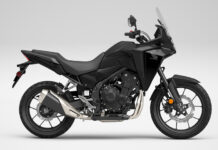photography by Kevin Wing and Riles & Nelson
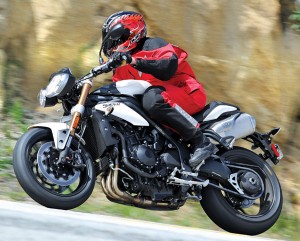
Motorcycle enthusiasts love all-new, never-before-seen models like cats love catnip. We get excited, even silly, about their latest-and-greatest technology, cutting-edge styling and envy-inducing allure. But there’s something to be said for a model that has stood the test of time, that has evolved steadily, strengths built up, weaknesses whittled away. Such is the case with the Triumph Speed Triple. Bug-eyed, muscular and very naughty, the Speed Triple brought streetfighter-styled motorcycles—sportbikes denuded of fairings and fitted with upright handlebars—to the masses. Since being launched in 1994 it has been a top-seller for Triumph, it begat the current best-selling Street Triple and it has embodied the in-line triple and dual headlights that have become Triumph hallmarks. Though improved over time, with an aluminum frame replacing steel, fuel injection replacing carburetion and displacement growing from 885cc to 1,050cc, the Speed Triple’s overall look hasn’t changed drastically since the single-sided swingarm and twin headlights were added in 1997.
Updating an icon is a daunting challenge. Just ask Pierre Terblanche. Charged with the unenviable task of designing a replacement for Ducati’s beloved 916/996/998 series, he penned the unconventional 999. It flopped. When it came time to give the Speed Triple a fresh look, Triumph’s owner John Bloor told Product Manager Simon Warburton, “Don’t f**k it up!” It may seem strange that changing a motorcycle’s headlights would create such brouhaha, but then again, getting a nose job was a career-killer for actress Jennifer Grey. For 2011, the Speed Triple’s circular lamps have been replaced with pentagonal ones, rounded on the outside with a scowling deep-V brow in the middle, like Wall-E with a chip on his shoulder. Larger, color-matched radiator shrouds deflect more engine heat away from the rider and provide a more cohesive look to the painted bodywork. The look of the wheels, swingarm and frame have also been spruced up.
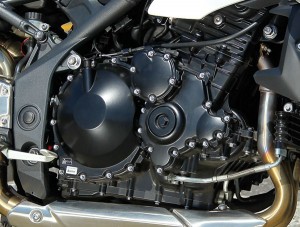
Beyond looks, Triumph has made the Speed Triple a better motorcycle. Tweaks to the ECU and stainless steel exhaust have coaxed more power out of its 1,050cc in-line triple. Compared to the 2008 model we last tested (Rider, December 2008), on Jett Tuning’s Dynojet dyno our 2011 Speed Triple spun up 124.3 horsepower at 9,200 rpm (up from 120.6) and 76.6 lb-ft of torque at 7,900 rpm (up from 71.1). With 67 to 76 lb-ft of torque available from 3,600-9,400 rpm, you’ve always got grunt available and you’re always in the right gear. The airbox now has more filter area, the redesigned oil sump allows tighter exhaust packaging for more ground clearance, the radiator is more efficient and new EFI software is said to boost fuel economy. It averaged 36.3 mpg during our 700-mile test, up slightly from the 35.5 mpg we recorded in 2008.
Sir Speed Triple’s all-new chassis is lighter and more responsive, with better weight distribution and more comfortable ergonomics. The single-sided swingarm is 0.7-inch longer but 2.2 pounds lighter, the rear wheel is 0.5-inch wider (up from 5.5 inches) but 3.3 pounds lighter and the front wheel assembly is 3.1 pounds lighter. Our test bike tipped the scales at 481 pounds wet, down 8 pounds from our 2008 test bike even though the current one is equipped with ABS, a new $800 option. The aluminum twin-spar frame has been made narrower for more cornering clearance. The engine was moved forward by 3mm and tilted forward a few more degrees, and the battery was relocated in front of the airbox to put more weight on the front wheel. Wheelbase has increased by 0.4-inch, to 56.5 inches, and steering geometry has been revised: rake has been reduced from 23.5 degrees to 22.8 and trail has been increased from 3.3 inches to 3.6.
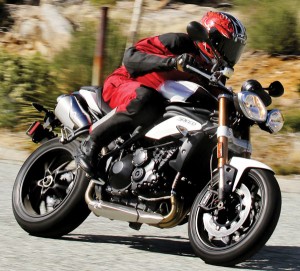
Ergonomics are now more like the best-selling Street Triple. The handlebar was moved back an inch, the footpegs were moved forward 1.1 inches, the rider was moved forward 1.7 inches and seat height was lowered 0.2-inch (to 32.5 inches, still pretty high), yet the seat was made 2 inches longer to provide more space between the tank and upward slope to the pillion seat.
The lighter, tighter, mightier Speed Triple is more fun to ride around town, on back roads and at the track. During the press launch, I spent half a day riding in circles at Chuckwalla Valley Raceway, in the Mojave Desert. The less committed riding position suits me just fine, and the more-forward weight bias (now 50.9 percent, up from 48.6 percent) and reduced unsprung weight help the Speed Triple feel more nimble and more stable. The Speed Triple’s calling card has always been awesome, right-now torque, which has made the bike popular at wheelie schools. Grab a handful of throttle in lower gears and the front end gets light, the grippy, wide 190mm (up from 180) Metzeler Racetec K3 Interact rear tire reassuringly glued to terra firma. With its fully adjustable Showa suspension, which now has more linear rear linkage, firmed up for the track, the Speed Triple absorbed pavement irregularities without losing its cool, and its radial-mount Brembo front calipers made it easy to scrub off speed or go full stop, the ABS never intrusive. As we’ve found on other Triumphs we’ve tested recently, there is a fair amount of initial travel on the adjustable front brake lever, and stopping power feels more linear than progressive. Fueling, handling and shifting were all precise, having benefited from years of refinement. Vibration at high revs is pronounced but at a frequency that’s more exhilarating than annoying; this is a bike that should feel rowdy rather than dull.
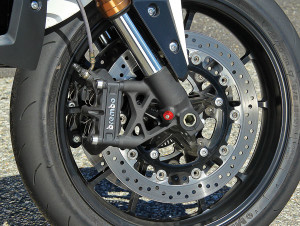
After devouring a BBQ lunch at Chuckwalla, temperatures neared 100 degrees. With my fill at the trough and track, I swapped my leathers for my Aerostich and made a beeline for the cooler higher elevations of Joshua Tree National Park. The Speed Triple’s revised seating position is a happy medium between sporty and upright, and the firm, deeply dished seat is comfortable. At cruising speeds, the in-line triple feels smooth, its exhaust note satisfying without being too loud. Ambling retirees snapping photos of cholla cactus and wildflowers took no offense. Riding the freeway home, I longed for the accessory fly screen, which 70 percent of Speed Triple owners buy, because the bike has no wind protection. Put in a 400-mile day on the Speed Triple and you’ll feel it in your neck and shoulders. The factory accessory catalog has lots of options, from a tire-pressure monitoring system to Arrow exhaust systems to a low seat, soft luggage and cosmetic enhancements. Naked bikes don’t make for the most ideal sport tourers, but you could do worse than the Speed Triple. Magnetic tankbags will find purchase on metal, and despite the twin underseat exhausts there’s actually a bit of storage space under the pillion, where you’ll also find fold-out bungee hooks and a standard toolkit.
The 2011 Speed Triple is better than ever at $11,799 for the base model, a $800-$1,300 premium over liter-class sport standards from Japan. Its new headlights and sharper look have grown on me, but not everyone on staff is enamored by the styling. The Speed Triple makes a strong statement and compels love/hate responses, but it has matured beyond its cyberpunk adolescence. In-your-face colors like Nuclear Red and Roulette Green are gone, replaced by a palette as traditional as Neapolitan ice cream: Crystal White, Phantom Black or Diablo Red. John Bloor should be proud.
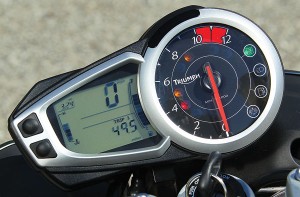
2011 Triumph Speed Triple 1050 ABS
Base Price: $11,799
Price as Tested: $12,599 (ABS)
Warranty: 2 yrs., unltd. miles
Website: www.triumph.co.uk/usa
Engine
Type: Liquid-cooled, transverse in-line triple
Displacement: 1,050cc
Bore x Stroke: 79.0mm x 71.4mm
Compression Ratio: 12.0:1
Valve Train: DOHC, 4 valves per cyl.
Valve Adj. Interval: 12,000 miles
Fuel Delivery: EFI w/ 46mm throttle bodies x 3
Lubrication System: Wet sump, 3.7-qt. cap.
Transmission: 6-speed, cable-actuated wet clutch
Final Drive: X-ring chain
Electrical
Ignition: Digital inductive
Charging Output: 444 watts @ 5,000 rpm
Battery: 12V 12AH
Chassis
Frame: Aluminum twin spar w/ single-sided aluminum swingarm w/ eccentric chain adjuster
Wheelbase: 56.5 in.
Rake/Trail: 22.8 degrees/3.6 in.
Seat Height: 32.5 in.
Suspension, Front: 43mm male-slider fork, fully adj. w/ 4.7-in. travel
Rear: Single shock, fully adj. w/ 5.1-in. travel
Brakes, Front: Dual 320mm floating discs w/ radial-mounted opposed 4-piston calipers & ABS (as tested)
Rear: Single 255mm disc w/ 2-piston pin-slide caliper & ABS (as tested)
Wheels, Front: Cast, 3.50 x 17 in.
Rear: Cast, 6.00 x 17 in.
Tires, Front: 120/70-ZR17
Rear: 190/55-ZR17
Wet Weight: 481 lbs.
Load Capacity: 420 lbs.
GVWR: 901 lbs.
Performance
Fuel Capacity: 4.6 gals., last 1.1 gal. warning light on
MPG: 89 PON min. (high/avg/low) 42.5/36.3/33.0
Estimated Range: 167 miles
Indicated rpm at 60 mph: 3,800
